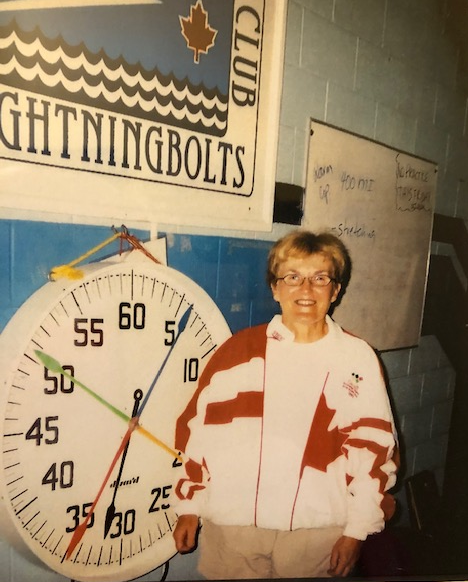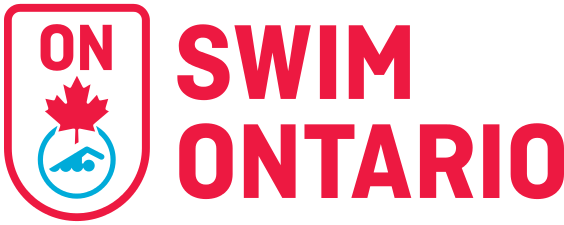Features
June 11, 2020
Celebrating Milestones, Big and Small

Marian Sweetnam
"I kept telling everyone that swimming was a great sport, and involved friendship, fitness and the family thing.” - Marian Sweetnam
By David Grossman
She may very well be one of a kind.
Mention the name “Sweetnam” around swimming pools in the Kawartha Region or, for that matter across Canada, and people will recall two-time Olympian, Commonwealth Games and World Cup swimmer, Nancy Sweetnam.
A great swimmer, indeed, but this story is about another woman, with the same surname, and who has repeatedly said “I never thought I was doing anything special”.
Marian Sweetnam, mother of that Olympic and world class swimmer, needs no justification for what she has accomplished as a coach, mentor, friend and many would say - the foundation for thousands of young swimmers.
Now, spending her time golfing, cycling and keeping physically active, the connection between the Lindsay Lightningbolts Swim Club and Sweetnam goes back several decades.
Housed in the old Lindsay Aquatorium on Albert Street, and now the Lindsay Recreation Complex, the Lightingbolts began in 1978 with only 15 swimmers and grew rapidly benefiting from coaching, volunteers, keen young swimmers and, of course, Marian Sweetnam.
Sweetnam is originally from Toronto, and from an area once known as Mimico in the southwest part of the city. As a child, her interest in swimming came while learning as a member of the Lakeshore Swim Club. She developed her competitive skills at the Etobicoke Memorial Aquatic Club, and would often take her bike to shuffle off to the pool.
Moving on, it was the 1970s and she settled in Lindsay, about a 90-minute drive northeast of Toronto, a small town situated at the south end of Sturgeon Lake. The first thing Sweetnam noticed was that Lindsay didn’t have an indoor swimming pool run by the municipality.
That didn’t go over well with her, and she joined with a group of people to generate interest in building a pool. Sweetnam helped raise money by knocking on neighborhood doors. The big push, back in those days, was for a hockey arena.
“I kept telling everyone that swimming was a great sport, and involved friendship, fitness and the family thing,” said Sweetnam, whose interest in the sport was revitalized in 1978. She was eager to ensure her three children learned to swim.
“I offered to coach young kids, develop a swim program – we just needed a pool – and, eventually, we had one.”
Sweetnam had a milestone career associated with all aspects of swimming.
In 1979, she took on the voluntary position as coach of the “Super Fish” – the name for the club that focussed on toddlers. It would be five years later, in 1984, when Sweetnam, filling a vacancy, accepted the job of head coach of the Lightningbolts and trained swimmers, through programs and specialized classes, from novice to international calibre.

Sweetnam had the job for a remarkable 18 years.
A self-taught coach, she spent time researching, asking colleagues about the sport and built up a wealth of knowledge.
Devoting countless hours to instructing children and youth all about the fundamentals of the sport, Sweetnam’s message was consistent: “improving was number one followed by doing your best while always having fun and developing friendships”.
When it related to the arts and science of coaching, Sweetnam was knowledgeable and even stressed the importance of good nutrition – something she knew about from her own studies.
Fascinated by the world of nutrition, Sweetnam studied it at the University of Guelph where she earned her degree, but she never wanted to be a teacher. While maybe not in the formal setting of a school classroom, Sweetnam loved being associated with youngsters.
She also turned out to be quite the educator - in the pool. She was always telling her swimmers that confidence came through success, Sweetnam maintained that there was always time to build on both.
“I was the grassroots swimmer, the mentor, the old school coach,” said Sweetnam, a former four-time recipient of the prestigious Ontario Female Swim Coach of the Year award and chosen three times as a member of the coaching staff at the Pan Pacific Championships and three more occasions at the World Cup European Tour.
“Swimming can create a positive environment for children to develop mentally, physically and emotionally,” said Sweetnam, who was also a former team manager, advising swimmers with a disability, and was extensively involved at the Paralympic team level.
The celebrated moments kept piling up for Sweetnam.
Surprised at recognition, Sweetnam would be selected as the first female to be named Canadian Swim Coach of the Year, and that honor came in 1990. Two years later, the Lindsay club won the Ontario Triple-A championship. A member of that team, Matt Rose, who was coached by Sweetnam, went on to swim for Canada at the Olympics, Commonwealth and Pan Am Games.
“What (Marian) did for that club had a huge impact on my swim career,” said Rose, now a physiotherapist living in Victoria, B.C. and travelling with Canada’s National swim team. “I remember her telling me you’re going to be a great swimmer, just be patient and grow (in height) a bit.
“For the (Lindsay) club, she was the pillar and took many swimmers to another level – they just took off under her guidance. We were quality oriented and technically sound.”
Rose remembers something called a “grab bag” that Sweetnam put together. It was a combination of left-over souvenirs from international competitions that her daughter, Nancy, and Marian, would bring back. If swimmers in the Lightningbolts club did well at a practice or meet, they’d get a chance to pick from the bag.
A valuable asset as a swimmer, parent, administrator, team manager and head coach, it was 1992 and again in 1996, that Swimming Canada chose Sweetnam to head a committee that would offer input in the selection of women as coaches in national and international events.
“Those were special times, something I really enjoyed,” said Sweetnam, now a member of the Lindsay and District Sports Hall of Fame and the Ontario Aquatic Hall of Fame. “I had a great career. There were times when I was a female coach in a man’s world. For me, I was just fortunate to be in the right place at the right time.”
Always enthusiastic, her constant encouragement stimulated and sparked young swimmers to levels they thought could never be accomplished.
Sweetnam has some fond memories of her coaching days. She chuckled at one of the initiatives used when a young swimmer in her Lindsay club ended up getting disqualified in a race. With the swimmer already disappointed and dejected, Sweetnam would approach the individual with an expression of not to worry and highlighted that tomorrow was another day.
Then, in an effort to create some pleasure, she would ask the swimmer if he, or she, wanted a Dairy Queen? With DQ being the symbol for elimination from a race, it was also the short form for the popular ice cream.
“Success is the greatest motivator of all, and I had a great program for them – one that stressed fun, created opportunities and allowed the kids to develop friends for life,” said Sweetnam. “Can’t beat that.”
David Grossman is a veteran award-winning Journalist, Broadcaster with some of Canada’s major media, including the Toronto Star and SPORTSNET 590 THE FAN, and a Public Relations professional for 45+ years in Canadian sports and Government relations.
